I had to start a new notebook this month. It’s a small red thing, leather, with a heart pressed into the cover. I hate the heart. I think it makes the whole endeavor of keeping the notebook look unserious. I could cover it but I don’t care enough; don’t know which adhesive to use; am not so unhappy with it that I would waste the time finding the right adhesive. I started the notebook in a moment of desperation as I was heading out the door one evening to some commitment or another. The composition notebook I’d kept for months, with its falling-apart spine and its broad pages, and too many things slipped between the covers, felt, suddenly, like a burden. I ditched it and grabbed what was closest at hand.
The red notebook was a Christmas gift—this past Christmas or the last, I can’t remember. It’s sat abandoned on a shelf in my office ever since. This is what happens when people give me notebooks, when they bypass the very personal process of notebook-selection and do me this favor: I re-gift them. The red notebook, had it not served an immediate need, would inevitably have become a gift for someone else. It would have had to sit on someone else’s office shelf indefinitely, still in its plastic sheath, while I, like the person who gave me the notebook, imagined someone happily using it. Then, possibly, it would have been re-gifted again. But once I made the first mark in the red notebook, I was committed to it. I’ve filled twenty pages in a week. It’s here to stay.
Here. What is this word? I’ve been back in New York three weeks and here has been so many places. Immediately upon returning, my husband left again for a film festival in Baltimore and I attended the launch of three chapbooks by O’clock Press authors at a poetry bookshop in Dumbo. One of the books was Charity Coleman’s Julyiary, a typewritten diary of her July 2014. Coleman gave herself the task of writing a page per day—just one page, with no other requirements. She is a poet, so naturally much of it reads like poetry. The first line of July 20th: “roll back the dance floor / underneath is a swimming pool / so cool.” The first line of July 21st: “digital colonialisms: what kind of pillar is the letter I?”
The page is treated as an open field; words flow in many directions; sentences are tucked into the corners of pages as if Coleman removed the sheet and re-inserted it. Is that cheating? The work is autobiographical. Or is it? Reading it aloud at the bookshop, Coleman skipped all over the page, bypassed middles of passages, stopped to explain: when she wrote this page, she was anticipating a breakup. Here, she was suffering an infected mosquito bite. And yet, despite the multitudinous interstices, with sometimes several minutes or several hours passing in a single line—once, she misses a whole day, at other times, most of a day—we feel we get to know Coleman, or at least, who she was last July. She took antibiotics; hung out with friends; talked with her mother; dealt her own tarot; visited a psychic; spent an inordinate amount of time staring out the window. In July of last year, she often watched the rain.
The following week, I took myself to another bookstore to hear Heidi Julavits talk about The Folded Clock and I began to think seriously about time. “What is the worth of a day?” she asks, and in The Folded Clock, an accounting of two years of Julavits’s life reorganized and edited down, and expanded according to the needs of the story (what story?), a day holds a year, ten years, or a whole childhood. From, “Today I,” she can go anywhere—a day can travel to any point in time and return again. Time has a unified quality in the book: a day spent swimming “the entire length of the harbor, and out into the Reach” (on the shore, “Time passed. Time passed,” she says) exists before or after or at the same time as her Maine town’s July 4th parade or the hurricane that destroys the tree in her front yard in Brooklyn (she asks for a cross-section but cannot find the rings to tell how old it is). It’s the same time as a trip to Germany with her husband, as the night she wears an old coat and finds her wedding vows in the pocket: “The contents of my pockets are like the diary I have, until now, failed to keep.”
The red notebook, had it not served an immediate need, would inevitably have become a gift for someone else. It would have had to sit on someone else’s office shelf indefinitely, still in its plastic sheath, while I, like the person who gave me the notebook, imagined someone happily using it.
I stood in the back of the bookstore taking notes about time in the composition notebook, its spine folded over as I propped it against my hip—the days of the pages folded over on themselves. Time is a Rolodex, an infinite but closed system, I wrote. Time is a sphere, hermetic but challenging ideas of chronology. Julavits shared the stage with three other writers, one of them Kate Zambreno, at whose house a few days later I jotted down notes about notebooks in the new red notebook: Walser’s Microscripts, Lawrence Weiner, Louise Bourgeois, Loren Eiseley. The next day, I glanced at my notes and ordered Loren Eiseley’s lost notebooks online for pocket change, planning far into the future while thinking about the past: the months I spent tramping around the U.S. with my old hardback Moleskine reading Eiseley’s The Night Country, living utterly in the present. Where is that Moleskine? It’s around here somewhere.
Here. What is here? How is it different from now? I’ve decided to use the red notebook differently than I used the composition notebook. That notebook was a place to collect ideas and take notes toward projects—a workbook for a single kind of work. But I want to work differently now; I want to work with time, as a material and also within it. I want to step into the water mid-stream and be still; want to honor the worth of a day. So, here is my vow: Each day, starting today (it is already 1 a.m.), I will set a timer for thirty minutes and will write until the last second. I’ll write anything. Like Coleman, I’ll fill the flat circle of the white page. Like Julavits, I’ll let my mind go anywhere in time and space. There will be no hesitation, but only dedication. And I’ll write about today, which is any day.
It’s 12:37 p.m. on Memorial Day. Last night, I wrote in the red notebook and then went to bed, and awoke this morning, and recorded a dream: My husband and I lived in a house with other people. Nazis invaded and forced everyone into the backyard, which was a concentration camp. We tried to start a band with another man and a woman, but the woman wouldn’t sing with me; she would only sing alone. My husband tried to convince her but she was immovable, and left to sit on a sunny patch of grass, away from us. The Nazis lined everyone up near the back door, with me first in line. My husband stood behind and tried to wrap his arm around my waist but I was afraid the Nazis would see and hurt him, so I swatted his hand away, and he pretended to swat a fly. I awoke as the Nazis opened the back door.
In her book Ongoingness: The End of a Diary, Sarah Manguso’s dreams remind her, if not of the march toward death, then of the constant march of time (what is the difference?). “In a dream I found an old-fashioned windup metronome on my desk,” she says, and later, “In another dream my tiny toothless son had all his teeth.” The book is a meditation on Manguso’s 25-year practice of keeping a daily diary as an attempt to comprehend her position in time—and an attempt to capture time before it slipped away from her, forgotten. With the birth of her son, her relation to time shifted; her relation to keeping a diary shifted; moments fused together, rushed past, were lost. Were irrelevant compared to the immediate needs of the baby, to the baby’s unarguable schedule—feed, sleep, feed, sleep.
This morning, after writing my dream in the red notebook, I walked to the supermarket for oranges. On the way home, I saw a baby bird struggling on the sidewalk. Someone almost stepped on him—I was forced to intervene. I removed the outer plastic bag from my double-bagged oranges and slipped both hands inside to lift the bird from the sidewalk. Holding it close to my chest, I walked up and down the block with my face to the sky. There was no nest in sight. No sounds of a nest anywhere. Back home, my husband made a nest in a Tupperware container while I called every veterinary clinic in the city, finding none open on Memorial Day. When finally one accepted us, we jumped in the car and drove up to 86th Street. The bird was fine, dehydrated but healthy. When we returned to our apartment, it was already after noon—the time I’d planned to spend reading this morning was gone. “I came to understand that forgotten moments are the price of continued participation in life, a force indifferent to time,” says Manguso.
I am someone who reads into dreams; every dream has significance, every dream contains some cryptic insight into the psyche. My husband is of a different mind: He believes dreams are little more than remixes of days, a jumbling together of images yet to be processed—like memory residue. This month, I’ve dreamed intensely. Inside the back cover of my copy of Ongoingness, I wrote, Last night, I dreamt I was in love with my female coworker, whom I don’t find attractive or unattractive. We gazed at each other on the train platform. I felt blissful all over. The other day, in my iPhone notes, I wrote: I dreamt my husband sent me into a pet store to pick out a dog. The lights were off and all the dogs were dirty and hungry. I wanted to save them. One of the first entries of the red notebook reads, Last night, I dreamt I was going to a friend’s funeral. On the way, I passed Daniel Defoe’s grave. The headstone was modern and well taken care of. Ivy grew nearby on a chain-link fence.
I am writing in the red notebook today. When I finish typing this paragraph, I am setting my kitchen timer for thirty minutes and I’m going to write with my hand. I’ll write whatever is there, on the top of my mind. I won’t care to make sense—I’m a poet. What is sense? I won’t care if what I’m writing is important today—if it is there, I trust that it’s important here, now. I’ll write with my hand until the bell goes off. I won’t wait for that moment. I’ll know that it’s coming. I’ll know there’s no way to stop it. And I can’t rush it forward. I’ve set the time. The chime is coming.
Paper Trail is a monthly column exploring the relationship between artists and their journals.






